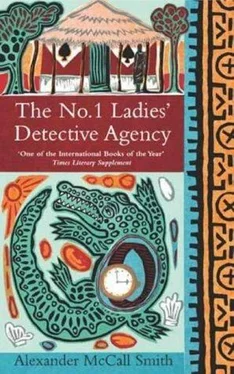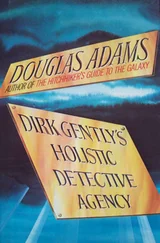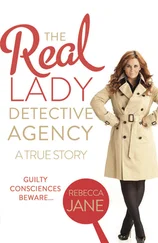"Of course I couldn't tell her to her face she was a liar and that I wasn't a dress-hire shop," said Grace. "So I asked her if she had enjoyed the wedding. She smiled and said that she had. So I said I enjoyed it too. She obviously hadn't seen me there. She stopped smiling and she said that maybe she'd give the dress another chance."
"She's just a porcupine, that woman," said Mma Ramotswe. "A hyena," said Grace. "An anteater, with her long nose."
The laughter had died away, and Grace had gone off, allowing Mma Ramotswe's bad mood to settle back in place. It seemed to her that she might continue to feel like this for the rest of the weekend; in fact, she was worried that it could last until the Komoti case was finished-if she ever finished it.
Mma Ramotswe paid her bill and left, and it was then, as she was walking down the front steps of the hotel, that she saw Dr Komoti in the Mall.
FOR A moment Mma Ramotswe stood quite still. Dr Komoti had crossed the border last night just before seven in the evening. The border closed at eight, which meant that he could not possibly have had time to get down to Mafikeng, which was a further forty minutes' drive, and back in time to cross again before the border closed. So he had only spent one evening there and had come back first thing that morning.
She recovered from her surprise at seeing him and realised that she should make good use of the opportunity to follow him and see what he did. He was now in the hardware store, and Mma Ramotswe lingered outside, looking idly at the contents of the window until he came out again. Then he walked purposefully back to the car park and she watched him getting into his car.
Dr Komoti stayed in for the rest of the day. At six in the evening he went off to the Sun Hotel where he had a drink with two other men, whom Mma Ramotswe recognised as fellow Nigerians. She knew that one of them worked for a firm of accountants, and the other, she believed, was a primary schoolteacher somewhere. There was nothing about their meeting which seemed suspicious; there would be many such groups of people meeting right at this moment throughout the town- people thrown together in the artificial closeness of the expatriate life, talking about home.
He stayed an hour and then left, and that was the extent of Dr Komoti's social life for the weekend. By Sunday evening, Mma Ramotswe had decided that she would report to Dr Maketsi the following week and tell him that there was unfortunately no evidence of his moving in drug-abusing circles and that he seemed, by contrast, to be the model of sobriety and respectability. There was not even a sign of women, unless they were hiding in the house and never came out. Nobody had arrived at the house while she was watching, and nobody had left, apart from Dr Komoti himself. He was, quite simply, rather a boring man to watch.
But there was still the question of Mafikeng and the Friday evening dash there and back. If he had been going shopping down there in the OK Bazaars-as many people did-then he would surely have stayed for at least part of Saturday morning, which he clearly did not. He must have done, then, whatever it was he wanted to do on Friday evening. Was there a woman down there-one of those flashy South African women whom men, so unaccountably, seemed to like? That would be the simple explanation, and the most likely one too. But why the hurry back on Saturday morning? Why not stay for Saturday and take her to lunch at the Mmbabatho Hotel? There was something which did not seem quite right, and Mma Ramotswe thought that she might follow him down to Mafikeng next weekend, if he went, and see what happened. If there was nothing to be seen, then she could do some shopping and return on Saturday afternoon. She had been meaning to make the trip anyway, and she might as well kill two birds with one stone.
DR KOMOTI proved obliging. The following Friday he left the hospital on time and drove off in the direction of Lobatse, followed at a distance by Mma Ramotswe in her van. Crossing the border proved tricky, as Mma Ramotswe had to make sure that she did not get too close to him at the border post, and that at the same time she did not lose him on the other side. For a few moments it looked as if she would be delayed, as a ponderous official paged closely through her passport, looking at the stamps which reflected her coming and going to Johannesburg and Mafikeng.
"It says here, under occupation, that you are a detective," he said in a surly tone. "How can a woman be a detective?"
Mma Ramotswe glared at him. If she prolonged the encounter, she could lose Dr Komoti, whose passport was now being stamped. In a few minutes he would be through the border controls, and the tiny white van would have no chance of catching up with him.
"Many women are detectives," said Mma Ramotswe, with dignity. "Have you not read Agatha Christie?"
The clerk looked up at her and bristled.
"Are you saying I am not an educated man?" he growled. "Is that what you are saying? That I have not read this Mr Christie?"
"I am not," said Mma Ramotswe. "You people are well educated, and efficient. Only yesterday, when I was in your Minister's house, I said to him that I thought his immigration people were very polite and efficient. We had a good talk about it over supper."
The official froze. For a moment he looked uncertain, but then he reached for his rubber stamp and stamped the passport.
"Thank you, Mma," he said. "You may go now."
Mma Ramotswe did not like lying, but sometimes it was necessary, particularly when faced with people who were promoted beyond their talents. An embroidering of the truth like that-she knew the Minister, even if only very distantly- sometimes gingered people up a bit, and it was often for their own good. Perhaps that particular official would think twice before he again decided to bully a woman for no good reason.
She climbed back into the van and was waved past the barrier. There was now no sight of Dr Komoti and she had to push the van to its utmost before she caught up with him. He was not going particularly fast, and so she dropped back slightly and followed him past the remnants of Mangope's capital and its fantouche Republic of Bophuthatswana. There was the stadium in which the president had been held by his own troops when they revolted; there were the government offices that administered the absurdly fragmented state on behalf of its masters in Pretoria. It was all such a waste, she thought, such an utter folly, and when the time had come it had just faded away like the illusion that it had always been. It was all part of the farce of apartheid and the monstrous dream of Verwoerd; such pain, such long-drawn-out suffering-to be added by history to all the pain of Africa.
Dr Komoti suddenly turned right. They had reached the outskirts of Mafikeng, in a suburb of neat, well-laid-out streets and houses with large, well-fenced gardens. It was into the driveway of one of these houses that he turned, requiring Mma Ramotswe to drive past to avoid causing suspicion. She counted the number of houses she passed, though-seven- and then parked the van under a tree.
There was what used to be called a sanitary lane which ran down the back of the houses. Mma Ramotswe left the van and walked to the end of the sanitary lane. The house that Dr Komoti entered would be eight houses up-seven, and the one she had had to walk past to get to the entrance to the lane.
She stood in the sanitary lane at the back of the eighth house and peered through the garden. Somebody had once cared for it, but that must have been years ago. Now it was a tangle of vegetation-mulberry trees, uncontrolled bougainvillaea bushes that had grown to giant proportions and sent great sprigs of purple flowers skywards, paw-paw trees with rotting fruit on the stems. It would be a paradise for snakes, she thought; there could be mambas lurking in the uncut grass and boomslangs draped over the branches of the trees, all of them lying in wait for somebody like her to be foolish enough to enter.
Читать дальше












